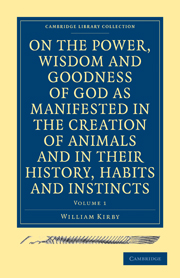Book contents
- Frontmatter
- Contents
- EXPLANATION OF PLATES
- INTRODUCTION
- CHAP. I Creation of Animals
- CHAP. II Geographical Distribution of Ditto
- CHAP. III General Functions and Instincts of Ditto
- CHAP. IV Functions and Instincts. Infusories
- CHAP. V Functions and Instincts. Polypes
- CHAP. VI Functions and Instincts. Radiaries
- CHAP. VII Functions and Instincts. Tunicaries
- CHAP. VIII Functions and Instincts. Bivalve Molluscans
- CHAP. IX Functions and Instincts. Univalve Molluscans
- CHAP. X Functions and Instincts. Cephalopods
- CHAP. XI Functions and Instincts. Worms
- CHAP. XII Functions and Instincts. Annelidans
- APPENDIX
- NOTES AND ILLUSTRATIONS
- Plate section
CHAP. X - Functions and Instincts. Cephalopods
Published online by Cambridge University Press: 29 August 2010
- Frontmatter
- Contents
- EXPLANATION OF PLATES
- INTRODUCTION
- CHAP. I Creation of Animals
- CHAP. II Geographical Distribution of Ditto
- CHAP. III General Functions and Instincts of Ditto
- CHAP. IV Functions and Instincts. Infusories
- CHAP. V Functions and Instincts. Polypes
- CHAP. VI Functions and Instincts. Radiaries
- CHAP. VII Functions and Instincts. Tunicaries
- CHAP. VIII Functions and Instincts. Bivalve Molluscans
- CHAP. IX Functions and Instincts. Univalve Molluscans
- CHAP. X Functions and Instincts. Cephalopods
- CHAP. XI Functions and Instincts. Worms
- CHAP. XII Functions and Instincts. Annelidans
- APPENDIX
- NOTES AND ILLUSTRATIONS
- Plate section
Summary
We have now taken leave of what may be called the proper Molluscans, including the Bivalves, and Univalves of Aristotle and Linné, or the Conchifers and Molluscans of Lamarck, and are arrived at a Class remarkable, not only for their organization, form and habits, but also for their position in the animal kingdom; for in their composition they seem to include elements from both the great divisions of that kingdom: from the Vertebrates—the beak, the eye, the tongue, an organ for hearing, the crop, the gizzard, and an analogue of the spine, with several other parts enumerated by Cuvier; and from their own sub-kingdom, many of their remaining organs. We may descend to the very basis of the animal kingdom for the first draught of their nervous system, for it is discoverable in the wheel-animals in which Ehrenberg detected pharyngal ganglions and a nuchal nervous collar; the sucker bearing arms seem to have their first outline in the fresh water polypes; indeed if the mouth of the cuttle-fish with its suckers, be separated from the head, leaving behind the long arms, we see immediately an analogue of a radiary, particularly of a star-fish, with its rays bearing suckers below, and its central mouth. The lamellated tentacles observed by Mr. Owen in his work, before quoted, on the animal of the Pearly Nautilus, above and below the eyes, seem to lead to the antennæ of Crustaceans and Insects, and numerous Molluscan characters are obvious to every one.
- Type
- Chapter
- Information
- On the Power, Wisdom and Goodness of God as Manifested in the Creation of Animals and in their History, Habits and Instincts , pp. 303 - 317Publisher: Cambridge University PressPrint publication year: 2009First published in: 1835



